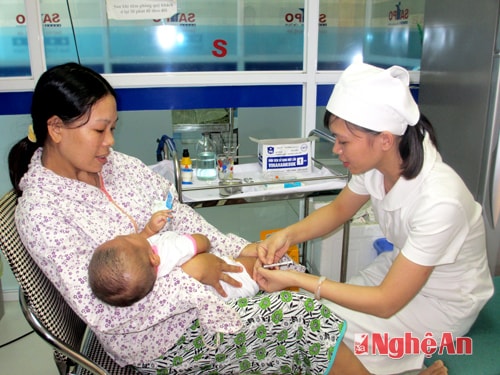Measles-rubella vaccination campaign: Need for coordinated action
(Baonghean) - From October 1, for the first time, the measles-rubella vaccination campaign will be widely deployed across the province. In addition to the health sector, there will be participation from many other departments and sectors, especially the education sector and the provincial border guards...
 |
| Vaccination for children at the Provincial Center for Preventive Medicine. |
In just 2 months (April, May 2014), 100 children nationwide died from measles and complications from measles. In Nghe An, although there were no deaths, many children had to be transferred to higher-level hospitals for treatment with severe disease progression. The widespread measles epidemic has impacted people's awareness, especially in measles vaccination to prevent the disease in children.
Rubella is an infectious disease caused by a virus and is easily spread through the air when a carrier sneezes or coughs. The disease is not too dangerous and does not cause many complications for young children, but it is extremely dangerous for pregnant women; congenital rubella syndrome is the main cause of birth defects. Medical studies show that when a woman is infected with the rubella virus in the early stages of pregnancy, up to 90% of cases can transmit the virus to the fetus. As a result, the fetus dies or can cause congenital rubella syndrome with severe malformations. Among children with congenital rubella syndrome, over 90% have complex malformations that affect their health such as heart defects, 45% of children have cataracts, 37% have enlarged spleens, 15% have kernicterus, and 12% of children have developmental delays. What is worrying is that currently the number of women of childbearing age vaccinated against rubella is very low, so if they get the disease during pregnancy, it is difficult to avoid the risk of birth defects.
Even in the case of Dr. Nguyen Thi N, at Nghe An General Hospital, she contracted rubella when the fetus was 5 months old. When she was born, the child was deaf from birth. Before the age of 2, she had to wear headphones, which was very inconvenient and difficult. The case of Ngoc Trang, which we met at the provincial Center for Education and Vocational Training for Disabled Children, is also very pitiful. Trang is 16 years old this year, but her cognition is no different from that of a child, because she has very severe disabilities in cognition, pronunciation, and the ability to hear and speak. Ms. Lan, the child's mother, confided: When I was pregnant with her child, I got sick and had a rash. But at that time, information was limited, so I was subjective, thinking it was a normal illness. After giving birth to a child with disabilities, I found out that it was a consequence of rubella transmitted from the mother.
One of the reasons why the number of children with disabilities is still high is that for many years, there has not been any vaccination program that includes rubella injections. The service injection has only been deployed in cities, towns, and only in small numbers because the cost is quite expensive. That is also the reason why people are very excited about the news that the Ministry of Health is implementing a free measles-rubella vaccination campaign nationwide. Mr. Tran Nguyen Trieu, Deputy Head of the Medical Affairs Department, Department of Health, said: Full vaccination with measles-rubella vaccine can help the immune response to the disease achieve a protection efficiency of up to 95% and last a lifetime.
According to the plan of the Department of Health, the measles-rubella vaccination campaign in Nghe An province will start from October 1, 2014 and last until January 2015 for about 760,000 children aged 1-14 years old and will be divided into 3 phases. Phase 1, from October 1 to October 15 for children aged 1-5 years old (for children born from January 1, 2009 - August 31, 2013, attending kindergarten); Phase 2, from November 16 to December 31 for children aged 6-10 years old (for children born from January 1, 2004 - December 31, 2008); Phase 3, from January 2 to February 15, 2015 for children aged 11 to 14 (for children born from January 1, 2000 to December 31, 2003). With a large number of children vaccinated, lasting for many months, the program is not only implemented at commune health stations according to the regular vaccination schedule but also at many mobile vaccination points such as kindergartens, primary schools, secondary schools and cultural houses of blocks and hamlets. To ensure the safety of more than 1,000 mobile vaccination points at schools, Mr. Nguyen Trong Hoan, Deputy Chief of Office, Department of Education and Training said: The department has sent the measles-rubella vaccination plan to all education departments of districts, cities and towns so that schools can proactively inform, propagate and educate about the significance of measles elimination and rubella control; Coordinate with preventive medicine centers and local health centers to investigate and make lists of students in local schools, especially in kindergartens, preschools, and nurseries in remote, isolated, and border communes to avoid missing subjects. Coordinate inspection and supervision before, during, and after the campaign.
Due to the large area, difficult terrain, and the rainy season, vaccination in mountainous districts will face many difficulties. However, the health sector will actively coordinate with the Border Guard medical force in mobilizing, propagating, and screening children before vaccination. In addition, due to the mountainous characteristics, in mountainous districts, instead of vaccination in batches for each age group, vaccination will be implemented in all communes to ensure adequate vaccination for all children.
My Ha






